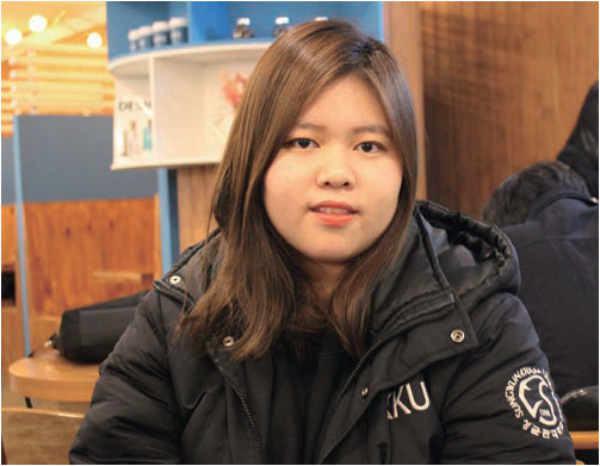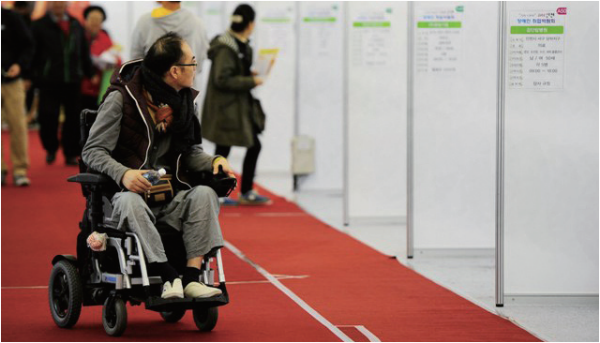A day for Persons with Disabilities is celebrated on April 20th every year in Korea. Regarding an increasing number of voices calling for improvement in the rights of people with disabilities, the government has implemented several related policies. The 2018 Seoul Metropolitan Government’s support plans for government employees adjusted a quota on the employment of people with disabilities to 5.13%, which is higher than the mandatory quota (3.2%). Now, it is not just the people of Korea that are voicing their opinions, but some Kingos are also starting to express their views on some of the issues related to people with disabilities. Therefore, the Sungkyun Times (SKT) met with Kim Ji-hyun, a leader of the school club “Equal” and heard about her opinions on disability issues within SKKU and the society.

Q1. Please introduce yourself and the club “Equal” to the Kingos.
Hello. I am Kim Ji-hyun (Economics, 16), a leader of the school club “Equal.” To briefly introduce the club, “Equal” aims to “integrate” students with disabilities together with students without disabilities. The club has two main goals: to promote friendship with students with disabilities and to improve Kingos’ awareness of disability. I have been doing a lot of activities with the club members in order to achieve these goals. For example, we set up booths on campus for students without disabilities to experience temporary disabilities and present about disability etiquette in the lecture rooms before classes start at the beginning of each semester. Cooperating with a startup company, we also researched places around SKKU where people with disabilities can access with wheelchairs and made a “barrier-free” map.
Q2. Are there any special reasons why you became interested in the problems that people with disabilities might encounter?
I was always interested in the socially vulnerable, but I barely knew about disabilities; I never had a friend with disabilities before. When I was a freshman, however, I once hurt my leg and had to wear a cast. One day, I was to meet my friends at a café, which turned out to be located on the 2nd floor. There was no elevator to get there, and the stairs were quite steep. Since I could not reach the café, in the end, friends had to look for another place. Through this experience, I realized that most buildings in Korea were quite inaccessible for people with disabilities and imagined how difficult it would be for them to get such places. This encouraged me to join “Equal” and to study more about the rights of people with disabilities. Doing many activities in the club, I feel rewarded a lot. For example, I sometimes go on a picnic or hang out with students with disabilities. Even though it is nothing out of the ordinary for me, they sincerely appreciate every moment, which makes me feel grateful.
Q3. There seems to be a wide range of difficulties that students with disabilities might undergo. What kinds of difficulties are likely to exist at SKKU?
At SKKU, there are more students with physical disabilities than students with visual or hearing impairments. The thing is, since the Humanities and Social Sciences campus is located on a high and steep hill, students with physical disabilities who use wheelchairs often have trouble accessing buildings on campus. For instance, there are stairs to get to the 1st floor of the Suseon Hall, which makes it quite difficult for students with disabilities to get up with wheelchairs. Furthermore, there is neither an elevator nor a ramp but only stairs at the student center. Students with physical disabilities cannot get up to the 2nd floor even with wheelchairs because there is no ramp, just stairs.
Q4. The government has been introducing policies to improve the quality of life for people with disabilities. Why do you think such policies cannot lead to a better understanding of people with disabilities?
There are mainly two types of government policies. One type is to set a quota on employment for those with disabilities, which is not that effective because most large companies would rather pay a _ne instead of employing more people with disabilities. The other is to establish workplaces that hire only employees with disabilities. Because of an isolated work environment per se, such a policy hardly seems to lead to a better understanding of people with disabilities. Likewise, people with and without disabilities are separated, in many other areas in our lives. Especially, there is almost no opportunity to take classes with students with disabilities at school. I think the country is not allocating enough money for the mainstream education to include students with disabilities. In my opinion, such an environment causes a huge gap between the government policies and people without disabilities’ levels of awareness of disability.

Q5. Although being considered a value with universal validity, “equality” is hard to achieve sometimes. What attitude do you think is the most necessary to realize the equality between people with and without disabilities?
I think the most important attitude is to consciously question things that are easily taken for granted. People without disabilities do not feel much inconvenience when there are no other ways but stairs to access to a building, when there is no Braille on the restaurant menu, nor when there is no sign language or subtitles on television programs. I believe that people’s awareness of disabilities will improve when they start to question things that were never found to be uncomfortable for them before. Once they start doing so, social policies would likely become more effective in turn. I also hope people will believe in a change for the better.
Q6. What is your image of an ideal society where people with and without disabilities can coexist harmoniously? It is a society where disability no longer means disability. If I have no trouble in accessing buildings without legs or acquiring knowledge without eyesight, that would not be a disability anymore. In addition, I hope people without disabilities can be fully aware of basic disability etiquette such as not mumbling when talking to a deaf person or taking a guide dog’s attention away from a blind person. For the realization of this image of an ideal society, I think education on disability etiquette and constructions for people with disabilities must be strengthened.
Q7. Any last words for the Kingos?
I think that no one can hold vested rights forever. Most people could belong to the socially vulnerable, while not being aware of the fact. For example, I could be socially disadvantaged as a woman even though I do not have any physical disabilities. I personally think that dividing people based on disabilities can be understood in the same sense. The rights of people with disabilities or those of the socially vulnerable such as women fundamentally derive from universal human rights. Therefore, improving the rights of people with disabilities would eventually lead to improving universal human rights. I hope Kingos will always keep in mind that solving fundamental social issues such as those related to people with disabilities would definitely create a society for the better.
